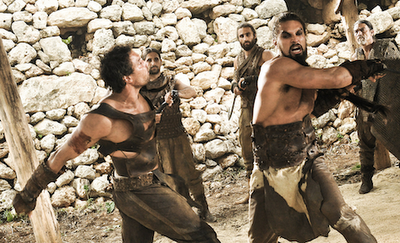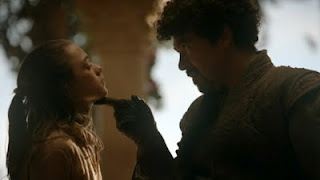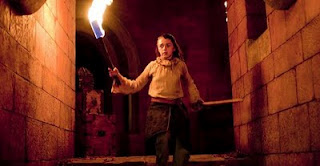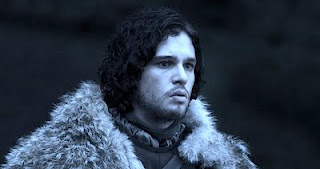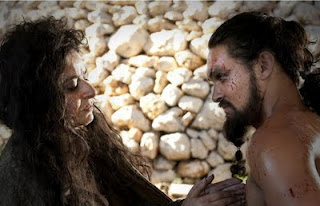If you want a job done properly, do it yourself. But, as Game of Thrones plunges ever closer to its bloody climax, Kieran Mathers wonders if authors are the best people to adapt their own works. Our usual mild spoiler warning applies.
This week’s episode was written by the man himself, G.R.R Martin, author of the entire A Song of Ice and Fire series. Normally, I’d wonder why they called on the author to adapt his own material, as it calls for different skills – you don’t see Joanne Rowling writing the scripts for the Harry Potter movies, for example. But in this case it works. Martin has a huge amount of experience in writing screenplays for shows such as The Twilight Zone and I think it’s clear that, like Douglas Adams, he also understands the difference in format.
One of the great strengths of the series is that it brings the spirit of the novel to the screen, without being too bound to every word. This is an extremely difficult task because it requires both loyalty to the source and artistic independence in equal measure. Knowing what to include and what to exclude, where changes and even improvements to the narrative can be made, takes courage and skill. The difference is akin to something like the film Watchmen (2009) where the script clung so closely to the graphic novel that the film was slow, dull and lifeless. Compare this to the emotional engagement in The Lord of the Rings, which was, at best, a pretty loose adaption of the books. It had all the beats you were expecting, and still managed to be a great set of movies in itself. Even very, very loose adaptations which change the time, the place, the style and everything else can still feel right – the latest Star Trek film, despite all the changes, still felt right.
What Game of Thrones has captured is that most nebulous of feelings. But, with that said, this is not a great episode. It has some great moments, but some equal moments of clumsiness which mar what could have been the best episode so far.
Firstly, the title is awful. It reference the tip of the sword which Arya owns, and the first bit of advice she ever received about sword fighting – “stick ‘em with the pointy end”. It’s also a metaphor, as this is the episode where the game of thrones becomes a game of swords. After the betrayal at the end of the last episode, it really was only going to end one way. Characters are mercilessly butchered by their enemies, and blood runs thick in the gutters of the aptly named Red Keep. But, it’s still awful titling.
The episode could have been better titled the ‘Madness of Mercy’. Eddard Stark finally gets to explain what he was thinking when he gave his enemies a chance – he was allowing the Queen’s children the chance to leave alive. His lack of ruthlessness or his failure to understand the ruthlessness of his foes led to this situation and a wonderful little conversation with Varys, who confronts him with both his and the audience’s questions. The acting on show here shines through so well because it’s free of distractions – the setting is so simple it could have been shot in black and white or on stage. Much like the Varys/Littlefinger scene in the earlier episodes, it shows good actors at the top of their game.
In opposition to this is the scene where Arya confronts the stable boy. The skill that Maisie Williams demonstrates is clear when confronted by the weakest child actor we have seen so far, and that uncharacteristically poor casting is brutally obvious, reducing a crucial moment of the character’s development to something unintentionally funny. Since it should be such a tragedy, I found this very disappointing.
The last stand of Syrio Forel (Miltos Yerolemouand) is a good moment but lacks the immense power of the scene in the book. I think that might be because it isn’t overly well choreographed (the editing is actually quite atrocious) and I didn’t think it was brutal or real enough. The effect of hitting a helmeted head with a wooden sword seems wildly overstated, and it wasn’t quite the step up in Syrio’s skills that I expected. I guess if you weren’t aware of what was about to happen, then it would have been a wonderful surprise. But having come prepared for something special, I left disappointed at the lack of power in the scene.
The other scene that didn’t work was the introduction of Lord Umber or The Greatjon (Clive Mantle) as he is known. The screams needed to be louder and more believable, and Mantle just didn’t carry it off. Plus, if a man losing two fingers to a wolf is the best joke the high lords can laugh at, I worry about the state of comedy in Westeros.
We also get our first piece of action from the Wall, where Jon Snow is taunted by his teachers. It’s great to see Harrington’s reserve crack again, with a real anger demonstrated in his reaction. This scene with Alliser Thorne (Owen Teale) is excellent, if only for the background dialogue of his friends which seems almost improvised.
Plus, I wasn’t expecting this show to take on (briefly) the mantle of a horror movie. But when Jon goes to investigate a new threat within the confines of Castle Black, we’re into the territory of creaking doors, moving shadows and sudden shocks. It’s a pace change and a credit to director Daniel Minahan that he could pull this off and make it not feel out of place. Plus, Jon has a fantastic little move of drawing his sword while spinning, which made me realise that the actor has the stunt fighting skills to really sell the combat. I’m hoping, if this show continues and adapts all the books, that we’ll get to see more of this.
Daenerys in the east takes it upon herself to start saving some of those her husband plans to butcher, and again I found myself questioning the character’s basic humanity. Accepting that this is a brutal world, surely finding your husband holding court near a pile of severed heads would make you doubt him? But she still seems enraptured and accepting of the price to be paid for her return to Westeros – villages raped and despoiled with people being carried away into slavery. Still she maintains her naiveté, asking ‘what these people did’ to deserve the attack. The short answer is that they were there to be enslaved.
When Jorah Mormont, perhaps speaking as the audience, tells her she has a “kind heart”, she responds by saying she does not, which makes her even less sympathetic. True queen of Westeros she may be, but at what point does the slaughter delegitimise her claim? Saving some of the women from rape by the Dothraki is a pointless gesture. When she did so, I was reminded of the line from Colonel Kurtz in Apocalypse Now: “We napalm their villages and then hand out band-aids to the injured.” A few souls saved does not redeem Dany from the horrors that she has instituted.
Finally, I feel really sorry for Jason Momoa, as he’s clearly been born in the wrong century. He is a great actor, especially when it comes to leadership, killing and violence – and there’s spectacularly gruesome violence this week, even by the show’s previous standard. However, this intimidating berserker rage seems so natural – and you can see it in his other roles – that I wonder if he’d been good at doing this for real. It’s a real credit to him that he can make something like the Dothraki horse-master seem so believable, so terrifying and yet so human.
The gutters of many lands are running red with blood and it isn’t going to stop now…

